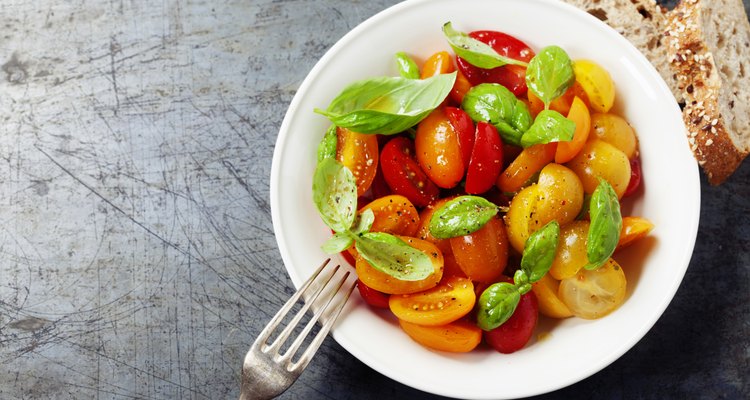
klenova/iStock/Getty Images
There is considerable debate in the nutrition community about cooked versus raw vegetables. Everyone knows that deep-frying vegetables negates much of the health benefit by adding a hefty fat and calorie burden, but when gentler cooking methods have shades of both benefit and detriment. Boiling is considered the least-beneficial of these cooking methods, because submerging vegetables into boiling water allows nutrients to leach out, leaving you with depleted veggies and a pot of vitamin water. Steaming is slightly different -- no contact with water means no leaching, but some nutrients are damaged by heat.
Calories and Macronutrients
Heat alone does not affect the calorie, fat, carbohydrate or protein content of vegetables. Because steaming doesn't require the use of cooking oils or other additives, steamed vegetables are just as low-calorie, low-fat and high-fiber as their raw counterparts. The caveat is that they must be eaten plain to retain these nutrient values. Adding butter, sauces and other toppings add extra calories and fat. Experiment with herbs and spices to add flavor to your steamed veggies, and avoid overcooking, which can reduce flavor.
Vulnerable to Depletion
The B vitamins and vitamin C are slightly depleted when vegetables encounter heat. These vitamins are simply sensitive to light and heat, and they denature rapidly under the stress of the high heat associated with cooking. Improper storage also depletes these nutrients, because even ambient light and heat are enough to initiate the breakdown process once plants are harvested. Buy your produce as fresh as possible to make sure you are at least starting out with the highest possible level of these vitamins, and use them promptly. Steaming doesn't make all vitamin content go away, but the potency is lower than it would be if the vegetables were eaten raw.
Allylic sulfides, the garlic compounds that have shown anticancer properties, according to the Arthritis Foundation, also break down in heat. However, allowing a crushed clove to sit for 10 minutes before cooking gives the enzymes time to stabilize, better withstand the stress of cooking, and deliver a more potent dose. Polyphenols also are often lost during steaming, but keeping the skin on the vegetables may help retain some.
Increased With Heat
Heat actually brings out certain nutrients, transforming them into forms that are easier for your body to absorb. Lycopene is a big one -- cooking tomatoes increases their lycopene content by three to four times. Lycopene has been associated with a reduced risk of heart attack and cancer and is usually low in raw-food diets. Steamed vegetables are also higher in antioxidants, and cooking can increase the beta-carotene in carrots. The anticancer compound indole actually forms when heat is present and is higher in steamed cabbage, broccoli and cauliflower than in raw.
Making It Work
The bottom line is that both steamed and raw vegetables are good for you, as long as you're eating your vegetables. It's best to consume a mix of both to ensure you get the best of both worlds and to eat the widest variety of vegetables possible. In most cases, the nutrient depletion caused by heat is not a major factor, and it won't change your overall health as long as your diet is balanced. Every vegetable is different, with different nutrients, properties and interactions -- what's true for one may not be true for another. This area of study has a long way to go before more specific recommendations can be made, so for now, eat your vegetables the way you like them best.
Related Articles
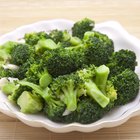
Nutrients for Steamed Broccoli

Nutrition Facts About Raw or Cooked ...
Does Slow Cooking Take Nutrients Out of ...
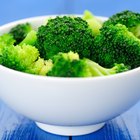
Ways to Cook Broccoli

Does Boiling Fruits Destroy Vitamins?

How to Cook Vegetables Without Losing ...

The Impact of Cooking Broccoli

How to Steam Vegetables in an Electric ...

Loss of Vitamin C Content From Cooking ...

Are the Nutrients Lost in Slow Cooking?
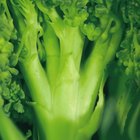
If I Puree Raw Vegetables Will That ...

Nutritional Values of Vegetables ...
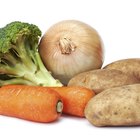
Do Boiled Vegetables Still Have Fiber?

Does Boiling Carrots Destroy the ...

Steaming vs. Boiling vs. Baking Carrots
Does Cooking Break Down Fiber?

Is Wheat Grass an Alkalizing Food?
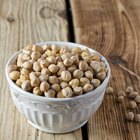
List of Vegetables That Contain Protein ...

The Advantages of Wok Cooking
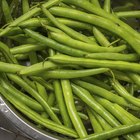
Nutritional Value of Sugar Snap Peas & ...
References
Writer Bio
Angela Brady has been writing since 1997. Currently transitioning to a research career in oncolytic virology, she has won awards for her work related to genomics, proteomics, and biotechnology. She is also an authority on sustainable design, having studied, practiced and written extensively on the subject.
Photo Credits
klenova/iStock/Getty Images